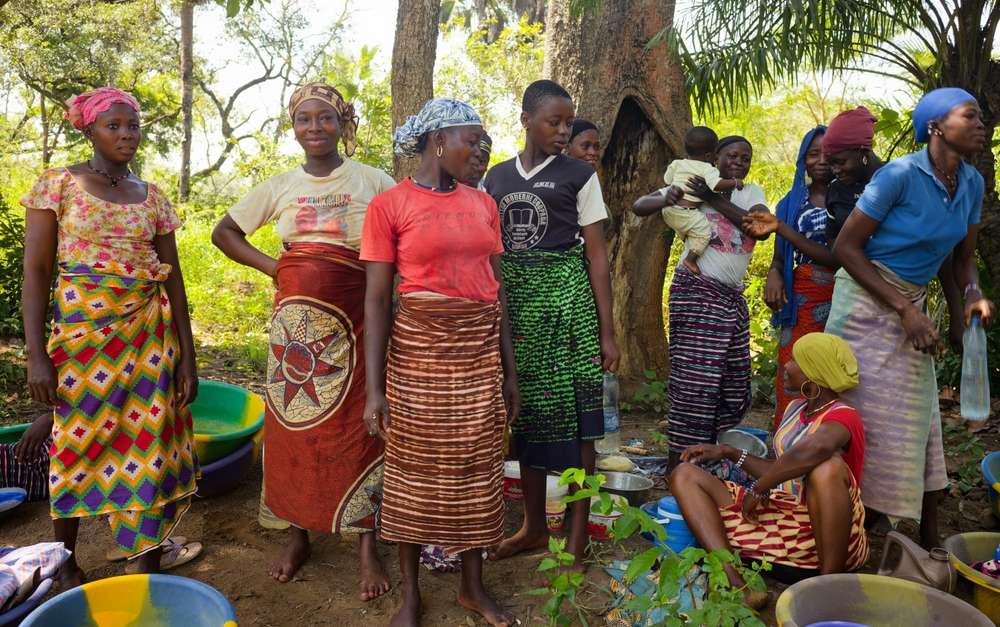New report by Oxfam and the Climate and Clean Air Coalition sheds light on the gender-differentiated impacts of super pollutants in Ghana and throughout the world
As a Ghanaian civil society activist working at the crossroads of gender justice and climate action, I welcome the launch of Towards Gender-Transformative Action on Super Pollutants, a new guidance report by Oxfam America and the Climate and Clean Air Coalition (CCAC). This report is more than a technical document; it is a call to action for governments, companies, and movements to confront the invisible toxins that fuel climate chaos and deepen existing inequalities.
Often, when we talk about climate change, carbon dioxide dominates the conversation. Yet, super pollutants like methane, black carbon, hydrofluorocarbons (HFCs), and tropospheric ozone are some of the most dangerous drivers of warming. Research has found methane to be over 80 times more potent than CO₂ over a 20-year period, while black carbon, HFCs, and tropospheric ozone worsen air quality and health outcomes. If unchecked, emissions are projected to rise by up to 17 percent by 2030.
In fossil fuel-dependent economies like Ghana and Nigeria, these pollutants are not only accelerating climate change but are also producing deeply gendered impacts often invisible in policy debates. These largely manifest in the health and socioeconomic perspectives of these emissions. Gender inequalities run through every sector where these pollutants are released—from agriculture to waste—and unless we design solutions that transform harmful norms and redistribute resources, the same injustices that marginalize women today will continue under the banner of climate action. The report is spot on: we cannot effectively mitigate the impact of super pollutants without addressing power and vulnerabilities. Africa's oil and gas sector accounts for about 68 percent of methane emissions from the energy sector primarily through venting, incomplete combustion of flared gas, and equipment and pipeline leaks, with a potential increase in emissions considering the anticipated growth in oil and gas activities. This emphasizes the importance of increased commitments to methane management within the continent's oil and gas sector.
Fossil Fuels: A Gendered Burden – Why This Matters in Ghana and the Global South
- Health and Physiological Risks: Communities in oil and gas catchment areas live under constant exposure to pollutants. For women, the risks run deeper. Prolonged exposure to pollutants from gas flaring in Nigeria’s Niger Delta has been linked to reproductive health complications, miscarriages, and infertility. In traditional settings where motherhood defines women’s social standing, these outcomes can bring not only illness but stigma and spousal abandonment. Closer to home, many Ghanaian women, especially those in rural communities, are exposed to black carbon from charcoal and kerosene. As primary caregivers and household cooks, they and their children suffer the brunt of respiratory diseases such as asthma and chronic bronchitis through increased exposure to indoor air pollution and other pollutants from waste burning sites, landfill sites or oil polluted sites.
- Increased Unpaid Care Work: Super pollutants worsen community health, particularly for children and the elderly. With methane fueling tropospheric ozone formation (which is linked to various respiratory diseases), cases of asthma and respiratory infections rise. Women, who shoulder most of the caregiving, spend countless hours tending to the sick, increasing loss of productive hours. The time that could otherwise go into education, work, or entrepreneurship. In effect, pollution robs women of both health and opportunity.
- Livelihood Loss and Economic Vulnerability: As accurately captured in the report, the impact of super pollutants is not limited to the fossil fuel sector. The ripple effects stretch into agriculture and fishing, sectors where women play critical roles. For countries across the African continent, where women dominate subsistence agriculture, contaminated water and soil through oil spills and flaring strip away livelihoods like farming and fishing. These are sectors where women play critical roles, forcing them into deeper economic dependence on men. That is, oil spills and flaring have degraded farmlands and rivers, leaving women farmers and fishmongers without sustainable livelihoods. For instance, in onshore oil development as predominant in Nigeria, smallholder women farmers in surrounding communities are significantly impacted. Meanwhile, men are more often hired in extractive industries since they in most cases possess relatively higher education and the required skills, hence retain relatively more economic security. These twin effects often push women into informal work and increased economic dependence on men.
- Climate Change and Social Stressors: Super pollutants are scientifically proven to accelerate global warming, worsening floods, droughts, and erratic rainfall. This is already evident across the African continent with many countries experiencing drought and risks of food insecurities. In Ghana, for instance, the prolonged dry spell in 2024 significantly affected crop yield driving food shortages and food inflation across the country. The Ghana Statistical Service consistently cited food prices as a major driver of the country’s historic 54 percent inflation. Women bare the heaviest burdens in such cases: struggling to feed families especially for woman-headed households, managing reduced farm incomes due to poor harvest, and caring for households left behind when men migrate in search of work in urban areas.
Pathways for Gender-Responsive Action
Addressing super pollutants can bring immediate climate and health benefits, but only if women are at the center of solutions.
- Stronger Regulation and Institutional Capacity: Countries must adopt stricter methane leak detection and repair measures, backed by transparent reporting.
- Promote Clean Cooking and Energy Alternatives in Rural Communities: Scale up women-led cooperatives and SMEs advancing ethanol and ethanol based cookstoves, communal solar kitchens and alternatives on pay per use models, and affordable electric cooking to cut black carbon exposure.
- Prioritize Investment in Women’s Leadership in Decision-Making: Ensure women’s representation in oil and gas regulatory bodies, climate councils, and community negotiations.
- Healthcare and Social Protection Systems: Expand reproductive and respiratory healthcare in high-exposure zones such as the Niger Delta and Ghana’s oil enclaves.
- Gender mainstreamed budgeting and development planning: In Ghana, civil society groups like the Africa Centre for Energy Policy (ACEP), Friends of the Nation, and Oxfam have been pushing for institutionalizing gender-responsive budgeting, calling for more budget allocation into pro-poor sectors like agriculture, education, and health where women remain the most vulnerable. This aligns with the transformative approach the report champions: moving beyond token participation to shift economic power.
A Call to Transform
The report’s recommendations echo what grassroots women have been demanding for years: gender impact assessments, fairer benefit-sharing, stronger laws, and intentional recruitment of women into technical and leadership roles in the extractive sector.
Tackling methane, black carbon, HFCs, and tropospheric ozone is not only a technical fix for climate change but also gender justice. In Ghana and Nigeria, women disproportionately bear the costs of these pollutants in their bodies, their work, and their livelihoods. But with the right policies, super pollutant reduction can be a triple-win strategy: safeguarding public health, advancing gender equality, and securing near-term climate benefits.
Moving Forward
The science tells us that cutting super pollutants is one of the fastest, cheapest ways to slow climate change. This is not just about reducing emissions, it’s about rebalancing power and rewriting the social contract between people, companies, and states. But as this report makes clear, it will only succeed if we root our solutions in justice. For Ghana, and for the Global South more broadly, the choice is clear: we cannot replicate old patterns of exclusion as we seek to accelerate progress on climate action. Climate solutions must deliver not only cleaner air but also fairer societies. Societies where women and other underrepresented groups have equal voice, equal opportunity, and equal protection.



